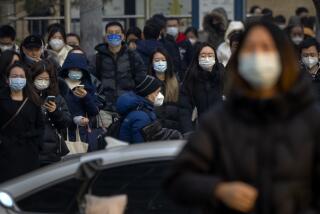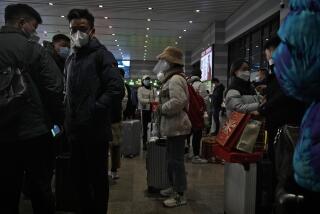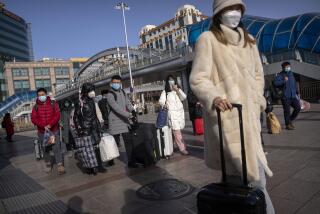SARS Panic Concerns Beijing’s Mayor
- Share via
BEIJING — The spread of the SARS virus is straining the capital’s medical facilities, sowing panic among residents and fueling the fear of civil unrest, the city’s acting mayor said Wednesday.
While expressing confidence that Beijing would defeat severe acute respiratory syndrome, acting Mayor Wang Qishan said at a live, televised news briefing that the situation remained severe. It was too soon to predict when the outbreak might subside.
“As the public’s panic has not yet been alleviated, a lot of work is needed to ensure social stability,” he warned.
Wang took office last week after China’s leaders fired his predecessor and the nation’s health minister for underreporting Beijing’s SARS cases by a factor of 10. The disease spread nearly unchecked for weeks.
The SARS crisis presents Wang and the rest of China’s leadership with a menacing mix of problems: a lack of confidence in public policy and information, heavy economic losses, fear of quarantines and other draconian restrictions, and a disease for which there is no known cure.
Beijing quarantined hundreds of residents Wednesday, with 11,282 people confined to home or hospitals.
The city also recorded 101 new SARS cases and nine deaths, bringing the toll to 1,440 infections and 75 fatalities. Of the new cases, 31 were previously listed as suspected cases, while 70 were new infections.
China has reported 3,460 cases and 259 deaths, according to state statistics. Worldwide, the disease has infected 5,462 people and killed 353.
China’s Foreign Ministry said that 94 countries had imposed varying degrees of restrictions on Chinese travelers, from simple health inspections in France and Russia to outright denial of entry in Saudi Arabia and Kuwait.
In Hong Kong, dismayed health authorities announced that 12 patients believed to have beaten SARS had suffered relapses. Six patients have since recovered, while the rest remain in hospitals in good condition, said Dr. Liu Shao-haei, senior executive manager of Hong Kong’s Hospital Authority.
The anomaly in China is Shanghai, a city with 16 million inhabitants but only two confirmed SARS cases. Shanghai officials on Wednesday said they were doing their utmost to keep the virus from spreading.
Officials were taking the temperature of all passengers entering and leaving the city’s airports, setting up roadside checkpoints to identify potential SARS carriers, encouraging migrant workers to stay put during the shortened May Day holiday and passing out 5 million leaflets to inform the public about how to prevent the disease.
“As far as the epidemic is concerned, we have never been optimistic,” said Peng Jin, deputy head of Shanghai’s health bureau. “This is a disease that started in the south and moved north. How did it skip Shanghai and jump to Beijing? It may have to do with the movement of people, but we don’t know. The reality is it headed north first and could move back south again.”
At the news conference, Beijing’s mayor admitted that the city’s medical facilities were being overwhelmed by the SARS outbreak.
“Beds at designated hospitals are in short supply and not all suspected patients are able to be hospitalized in a timely manner,” said Wang, 54.
Of the city’s 32,000 licensed doctors and 34,000 nurses, only 3,000 are capable of treating respiratory diseases, Wang said. Beijing had to bring in hundreds of army doctors to staff a new SARS field hospital that opened Wednesday in the city’s northern suburbs.
Masks, gloves and other protective gear as well as ambulances remain in short supply in Beijing, World Health Organization experts said.
Wang said that besides curing more SARS patients and lowering mortality rates, the mood of panic among Beijing’s residents was also a top priority.
“When they believe that when they get sick, they will receive good medical care,” he predicted, “then their fear will subside.”
Despite previous denials, Wang again was forced to repeat that there are no plans to seal the city or use airplanes to spray drugs on residential areas. Rumors of such actions have been spread through cell phones and the Internet.
There have been no SARS-related civil disturbances in Beijing, but villages on the city’s outskirts have erected roadblocks and barricades to keep outsiders away.
On Sunday, villagers in the neighboring municipality of Tianjin destroyed a schoolhouse that was being converting into a quarantine facility.
*
Times staff writer Ching Ching Ni, in Shanghai, contributed to this report.
More to Read
Sign up for Essential California
The most important California stories and recommendations in your inbox every morning.
You may occasionally receive promotional content from the Los Angeles Times.













